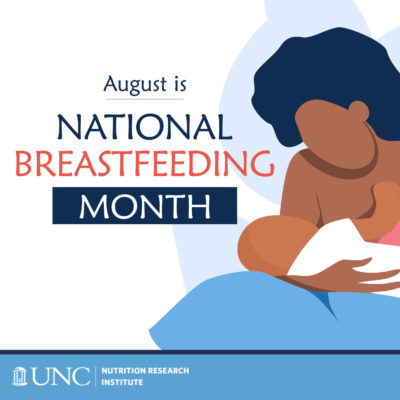As we celebrate Breastfeeding Awareness Month this August, the UNC Nutrition Research Institute (NRI) is proud to spotlight the work of one of our principal investigators, Carol L. Cheatham, Ph.D. Cheatham’s research is furthering our understanding of how nutrition can enhance brain development and function, particularly during critical stages of infant development.
Breastfeeding Awareness Month is dedicated to promoting the numerous benefits of breastfeeding for both infants and mothers. Breastfeeding provides essential nutrients that support infants’ growth and development, strengthens the mother-child bond, and offers protective health benefits. This month is an opportunity to raise awareness and encourage support for breastfeeding families.
Cheatham’s work primarily focuses on the relationship between an individual’s genes and the metabolism of nutrients, and how this relationship leads to differences in cognitive development. Her research zeroes in on the development of memory and attention–crucial components for learning and school readiness. In one of Cheatham’s notable studies, she and her team investigated whether supplementing children’s diets with omega-3 fatty acids can improve their memory capabilities over time. Cheatham’s research employs a variety of methods, from engaging children in interactive activities to using specialized equipment that measures brain activity as they view images on a computer screen.
The Cheatham Lab is currently conducting two studies with which they aim to understand how maternal diet during breastfeeding can influence infant brain development. The BRAINS study and the Infant Nutrition and Cognition study are both designed to explore whether certain foods consumed by breastfeeding mothers can enhance the nutrient content of their milk and subsequently boost their child’s cognitive abilities. In these studies, they are specifically investigating the effect of DHA, lutein, and choline on infant brain development.
With the Breastfeeding, Avocados, and Infant Nutrition Study (BRAINS), the Cheatham team seeks to determine if eating avocados during breastfeeding can increase brain-enhancing nutrients in human milk, thereby improving infant cognition. Participants in this study will visit the lab three times over three months. During this period, mothers will be randomized to either eat a provided avocado a day or to abstain from eating avocados. All mothers will maintain a food diary and provide milk and saliva samples. Their infants will engage in age-appropriate games and memory activities.
In the Infant Nutrition and Cognition study, the team will investigate if consuming eggs during breastfeeding has a similar beneficial impact on brain-developing nutrients in human milk. Participants will also visit the lab three times over three months – eating organic egg powder or egg white, keeping a food diary, and providing biological samples. Infants will participate in developmental games and activities during these visits.
Both studies are currently seeking 18 to 35-year-old women who are pregnant and plan to exclusively breastfeed or are currently exclusively breastfeeding babies younger than 3 months of age. Study participation will begin when the infant is 3 months old. Participants will be compensated for their time and contribution to this vital research.
Cheatham’s pioneering work has the potential to directly impact dietary recommendations for pregnant and lactating women, fostering healthier generations to come. Join us in celebrating Breastfeeding Awareness Month by supporting research that aims to nurture the minds of our future generations.
See if you qualify today! Call 704-250-5018 or email feedingbrains@unc.edu.

